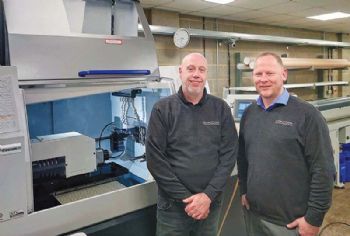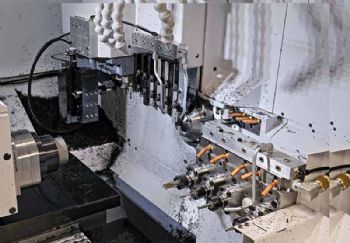
The Gloucester-based sub-contractor Stratos Precision Engineering, which sees most of its business coming from machining plastics, has strengthened and diversified its turning department with the addition of its first sliding-headstock lathe — a Citizen Cincom L32-VIIILFV.
Installed in September 2019, this twin-spindle 35mm-capacity bar-fed turn-milling centre joined five fixed-head single-spindle chucking lathes for turning parts up to 650mm in diameter.
Purchase of the seven-axis CNC Swiss-type lathe — supplied by Bushey-based Citizen Machinery UK Ltd (
www.citizenmachinery.co.uk) — was part of an investment of more than £1 million since the fourth quarter of 2018.
This also saw the installation of a new big-bore lathe and a CNC router with a 3 x 2m capacity and automatic tool change — plus the refurbishment of the 8,000ft
2 premises.
During the same period, the number of staff has doubled to 16, and turnover in the last financial year increased by nearly 50% compared to the previous 12 months.
Stratos’s managing director, Jonathan Caple, said: “For some years, we had been looking at buying a bar-fed lathe to increase our competitiveness, win new business and enter new industries by machining larger quantities of parts requiring tight tolerances.
“We favoured the sliding-head type over fixed-head lathes, as the short axis movements lead to higher productivity.
“Moreover, the twin-spindle configuration of these machines, together with their extensive driven tooling, often allows one-hit production and its associated benefits.
“However, to reap the full benefits of the investment, we need to be able to have the machine running 24/7 — either unattended or with reduced labour overnight — to maximise production output.
“That was previously impossible due to the stringy swarf that is produced when machining plastic, which regularly needs to be manually cleared by an operator.”
Swarf control
In 2016, Citizen introduced its patented LFV (low-frequency vibration) system.
Part of this resides in the Mitsubishi control of Cincom machines, and it can be switched on and off (if required) during the program; it ‘vibrates’ the servo axis in the cutting direction, so that the tool tip leaves the surface of the material being machined for regular (but ultra-brief) periods.
The effect is to break the long strands of swarf that are normally produced when turning plastics into short lengths of just a few mm, preventing the swarf from ‘birds-nesting’ in the machining area and then melting back onto the workpiece (this normally results in the part being scrapped).
Furthermore, Cincom machines are built ‘from the ground up’ to accommodate the high-frequency low-amplitude vibration resulting from the intermittent chip-generating cutting action — unlike other chip-breaking methodologies that simply involve macros in the part program.
A recent trend in this sub-contractor’s business has been a shift to machining an increasing amount of metals — notably aluminium for a large packaging-machinery contract, but also ferrous metals including stainless steel.
This material also results in stringy swarf forming around the tool and workpiece, so it benefits greatly from using Citizen’s LFV chip-breaking software.
Mr Caple and Stratos’s co-owner — operations director Mark Vine — recognised how beneficial LFV technology would be for the business when turning plastics.
Unlike metals, where the finish can be adjusted by fettling after machining, this is not practical with plastic, as it needs to come off any machine tool in a finished condition.
The importance of improving the turn-milling efficiency to increase competitiveness was reinforced when Stratos was required to produce 2,000 parts over a short period, and the existing machinery could only achieve 400 per day.
With the new sliding-head machine and LFV technology, Stratos can produce the 2,000 parts in 48hr.
Seamless transition
The transition on the shopfloor at Stratos to the new turning technology has been seamless, as has using the first Mitsubishi control on site.

One of the sliding-head lathe operators, who normally runs five machining centres at the Gloucester facility, quickly picked up programming of the L32 using Citizen’s Alkart Wizard off-line software.
He (and others) received two days of instruction at Citizen UK’s Midlands facility in Brierley Hill, followed by a week of on-site operator training.
In the period from machine installation to the end of January 2020, more than 30 jobs had been produced on the new lathe, which included some round-the-clock running.
A major benefit of a twin-spindle lathe is its ability to produce components machined at both ends in a single cycle — parts that would otherwise require two separate operations.
This is assisted by the availability of a multitude of tools, including driven cutters that enable the inclusion of extra operations — such as deburring — that eliminate further subsequent processes.
As a result, the rate of production is much higher on the bar-fed Citizen than on the fixed-head ‘chuckers’. For example, a 400-off contract that used to take a full day is now finished in a couple of hours on the sliding-head machine.
It also means that Stratos often manufactures in bulk, as the bar does not need to be changed as frequently as for multiple jobs.
Stratos can now run off 1,000 parts, deliver 400 to the customer and stock the remainder on consignment.
The customer benefits through more flexible supply and the certainty of prompt deliveries, while Stratos gains through more economical cost-per-part manufacture, which is passed on to the customer.
Another recent example of accelerated production was the machining of 5,000 steel pins for a chain conveyor; this job, which would previously have needed two operations on a pair of chuckers (along with two operators), was completed in five days working a single shift.
Without the new Citizen machine, this contract would not have been economical — or the margin would have been too small.
Mr Vine concluded: “The accuracy and surface finish that we are achieving on the slider are fantastic.
“We recently ran the machine unattended round-the-clock using LFV — with coolant running to keep the temperature stable — and produced 3,000 Ultem polyetherimide thermoplastic parts for a customer in the flow control sector.
“All of them were within the required -0/+0.05mm tolerance band, which is impressive with this material — and can be difficult to achieve.
“Moreover, we didn’t have to make any adjustments to the machine whatsoever.
“Overall, our new machinery has enabled us to be a more competitive sub-contractor for plastic and metal machining, and it is contributing towards the impressive growth of our business.”